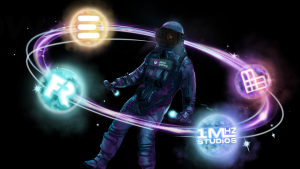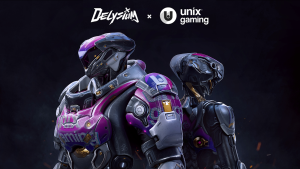
sponsored
One of the core principles of web3 gaming is the idea of decentralisation–more specifically, decentralised ownership of assets. But, the teams at Unix Gaming & Delysium believe that by limiting decentralisation to assets, developers have also been limiting themselves.
What started as a desire to create a genuinely next-gen open-world title, even attracting investment from companies like Y Combinator, Delysium has expanded beyond its original confines. Instead, the team at Delysium recently announced that their game would be available for multiverse operators to publish under licence in what they’re calling Decentralised Game Publishing. Unix Gaming will be their very first multiverse operator.
Why Not Just Publish It Themselves?
While the team at Delysium are more than capable of publishing their game, they believe this new approach enables it to evolve beyond even their wildest dreams. The example they give is Rockstar’s Grand Theft Auto V. While no one can argue that GTA V hasn’t been a truly incredible success, even Rockstar couldn’t predict how much it would evolve once put in the hands of gamers.
If you’re not familiar with GTA RP, or GTA Roleplay, it’s what happens when players take to the streets of GTA Online, taking on and acting out the roles assigned to them–be it a by-the-books police officer, innocent shop clerk, or east-side mob boss. Roleplay takes the idea of online second life to a whole new level, and it would have never happened if Rockstar maintained rigid control of the gaming experience.
To unlock the true potential of the world they’ve painstakingly built, the Delysium team hands keys to the castle to operators so they can put their unique twists on the experience–possibly taking it in inventive, exciting new directions. And, as it’s a web3 title, operators can use their token as the currency of the game’s world, adding more utility to their tokens.
When it came to choosing their first multiverse operator, the choice was an obvious one.
Like Delysium, Unix Gaming Does Web3 Gaming Differently
Unix Gaming has grown from strength to strength, starting as one of the largest play-to-earn guilds after raising $30M in 2021, now serving as the premier partner for many of the industry’s best web3 titles, including Delysium. And as part of its partnership with Delysium, Unix Gaming will collaborate on developing several game modes and play experiences within the first iteration of Delysium–set to launch in 2023.
In a recent blog update, Unix Gaming announced its new focus on empowering web3 developers through its ecosystem–starting with an end-to-end development SDK to a first-of-its-kind web3 gaming platform, OWNED.
Being Delysium’s first multiverse operator promises incredible new utility for the Unix Gaming token. It’s also an opportunity for its gaming studio, 1MHZ Studios, to flex its development muscles by assisting Delysium in defining this new approach to game publishing.
Both Delysium and Unix Gaming promise new updates soon. As part of their newfound collaboration, they also recently launched limited edition NFT skins providing access to an early version of the game.
The team at Unix Gaming described it as decentralised game testing, as players who purchase these skins provide essential data for refining the game and allow gamers to earn more than they paid for the skins in the first place.
This is a sponsored post. Learn how to reach our audience here. Read disclaimer below.
Image Credits: Shutterstock, Pixabay, Wiki Commons
Disclaimer: This article is for informational purposes only. It is not a direct offer or solicitation of an offer to buy or sell, or a recommendation or endorsement of any products, services, or companies. Bitcoin.com does not provide investment, tax, legal, or accounting advice. Neither the company nor the author is responsible, directly or indirectly, for any damage or loss caused or alleged to be caused by or in connection with the use of or reliance on any content, goods or services mentioned in this article.
Source: https://news.bitcoin.com/unix-gaming-delysium-are-decentralising-games-in-surprising-new-ways/


